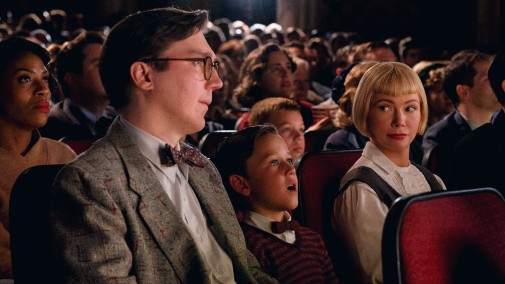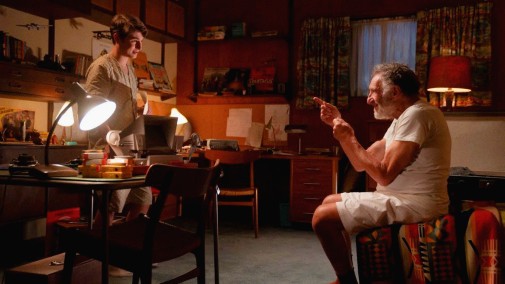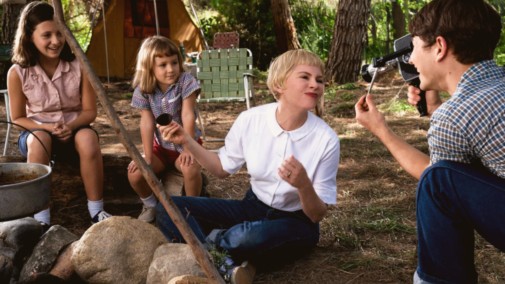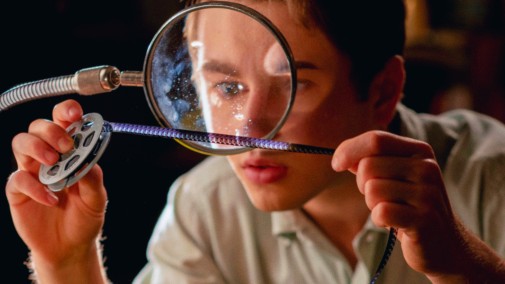
Around the holiday season of 1952, a Jewish couple takes their son to the movies in New Jersey. It's his first time watching a picture on the big screen, and the experience will change him forever. As Cecil B. DeMille's The Greatest Show on Earth unravels at 24 frames per second, the kid's eyes watch everything in starry awe, growing fearful as a massive train crash marks the narrative's climactic set piece. In the coming days, he'll ask for a trainset as his Hanukah present, growing obsessed with restaging the calamity he saw projected big on that magical place, the movie screen. So he doesn't ruin the expensive toy with multiple crashes, his mom suggests the boy films the crash with the dad's 8mm camera. And thus begins a love story bigger than life itself.
In reality, the boy's name was Steven Spielberg. In this latest memory play turned film fantasy, or private secret elevated to public spectacle, he's Sammy Fabelman…

Love letters to cinema that are also memoirist exercises for their directors are all the rage now. That's not necessarily bad, for that kind of experiment has inspired many great films, including older examples like Terence Davies' The Long Day Closes from 1992. However, for every Davies dream, we get a Branagh nightmare, so it's not like we're all swimming in floods of great films about film-loving and film-making. As if to set the record straight and show everyone how it's done, modern Hollywood's greatest classicist has come up with his own variation on the model.
The results are almost too good to be true, a miracle of formalism in tandem with sentimentality, lacerating observations on domestic fractures tempered by a frank appreciation of what movies can do. Sure, the craft calls attention to itself, but that's the point. Before going too far into hyperbole, one might as well admit that not everything works. As much as I love Tony Kushner's work, The Fabelmans can be overwrought at times, its themes too plainly stated with an articulateness that's only occasionally matches the characters.
Monologues aplenty feel forced, even when they facilitate great performances like Judd Hirsch's barn-burning spiel about the price of art, becoming a master is akin to a pyrrhic victory. It's a foreboding message that reaches its apex when Sammy can't seem to perceive, nearly disassociating from his emotions. Regardless, whatever fails in terms of character interaction is forgotten when one considers the brilliant structure of this thing. At 151 minutes, The Fabelmans should feel long. Instead, it flies by. This care for rhythm and propulsive energy underlining every meandering moment is also manifest in the tonalities at work.
For those who see Spielberg as a pablum peddler, there's plenty here to justify that belief, but there's also an unexpected variety of registers. The carefully observed quality of the family dynamics is unsurprisingly poignant, but it also often verges on sweetness-destroying acidity. The Fabelmans is also funny, especially when it drifts away from home into the perilous land of high school romance. A scene laden with Christian iconography jumps out as one of the most hilarious things Spielberg has ever directed and made me yearn for his take on a sex comedy. Another surprise is how much the younger cast members rise above their older costars.

In the roles of Sammy's parents, Paul Dano and Michelle Williams have sublime moments – his last scene, the many instances when she watches her son's work. Still, they rarely surprise or make an unworkable line work. On the other hand, their on-screen children hit the ground running and never let up. There are no two ways about it – The Fabelmans belongs to Gabriel LaBelle in a star-making turn. Playing the older Sammy, he's astonishing, often asked to project adolescent confusion falling into cruelty, apathy, anger, and sometimes passion. He's magnetic in that way Spielbergian kids so often are while allowing complexity to seep into the Amblin-awe.
As a film lover with three sisters and a close relationship with his mother, partially forged in the fire of shared mental health issues, it was easy to find common ground with LaBelle's portrait of Sammy. Moreover, I was an easy mark for much of the movie's emotional pull. Nevertheless, The Fabelmans' effectiveness goes beyond personal associations. That's notable in moments detached from the family melodrama, when the focus is on an artist's development, the understanding and misunderstanding of their creations.
Spielberg's past filmography echoes through it all like a scream in a cavern, revealing just how much the auteur's overall work is an expression of self, be it the trauma of the parents' divorce or a continuation of juvenile loves. It's also a desperate attempt at giving order to what has none, trying to take control over the chaos of life through the camera's gaze. This particular thread can feel didactic but it's hard to care because so few films, even meta-cinematic pieces, ever problematize what a camera does or the value of framing, blocking, showing or not showing. Moreover these elements and preoccupations set up what might well be the best final shot of the year.

Speaking of endings, it's time to bring this review to a close. Leaving the theater, I felt akin to what one imagines little Sammy Fabelman felt after watching DeMille's Best Picture winner. My entire body was electrified by cinema, mind abuzz with ideas and adoration. That said, despite the love, I can understand some of the movie's naysayers and their critiques. To call negative notices reactionary backlash, a mere byproduct of Oscar buzz, is reductive and a disservice to everyone involved, including the filmmakers. Let's honor the creative spirit by accepting that art belongs to its audience, that each person has a unique experience that might go against what the artist intended. Your eyes might see something that someone else watching doesn't and vice versa. That's not wrong – it's just how movies work.
The Fabelmans is currently in theaters. Don't miss it!